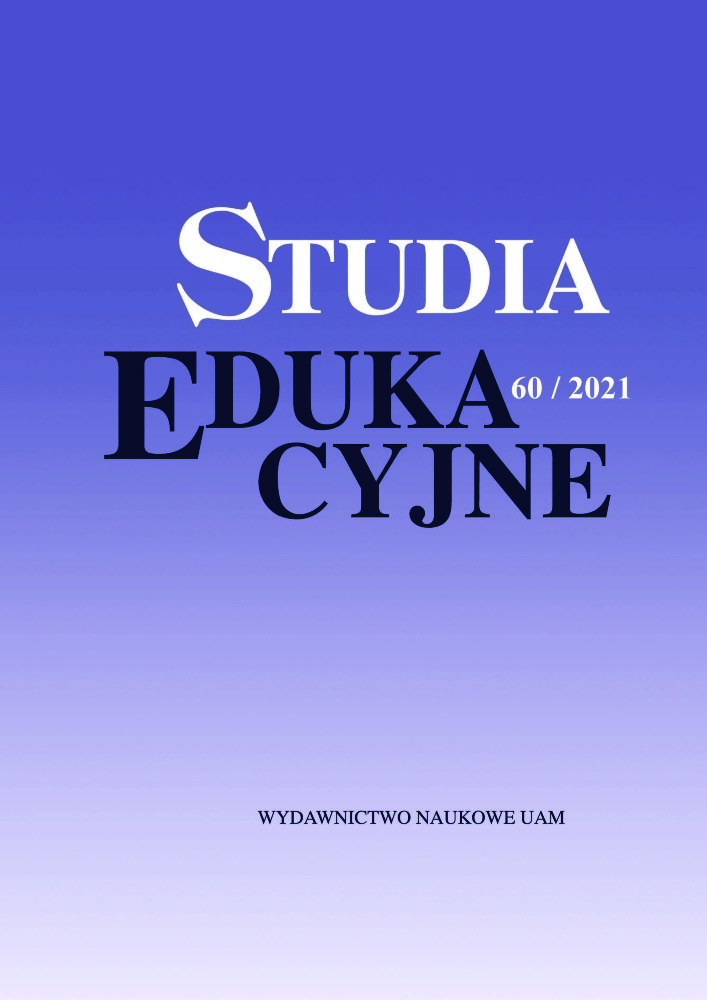Abstract
The Author of the article reconstructs the origin and development of rankings of higher education institutions. In the first part the current ranking are listed and the importance of rankings for universities is stressed. Next, the beginning of American rankings in the XIXth century is presented as well ad turning points in methodologies of evaluation. The rankings created by Charles Babcock and James McKeena Cattell in the first decades of XXth century are analysed. The special attention is paid to changes in criteria used to assess the educational institutions in subsequent decades. In conlusive part the Author criticizes rankings for one-dimensional and reductionist approach to academic world.
References
America’s Great Scientist Rapidly Decreasing, “The New York Times Sunday Magazine”, 20 November 2010, http://www.sundaymagazine.org/wp-content/uploads/19101120-2-americas.pdf
Assesment of Research Doctorate Programs in United States in Engeneering; Assesment of Research Doctorate Programs in United States in Mathematical and Physical Sciences, https://www.nap.edu/read/9778/chapter/1#v
Assesment of Research Doctorate Programs in United States in Humanities, red. L.V. Jones, G. Lindzey, P.E. Coggeshall, Washington 1982.
Babcock K.Ch., A Classification of Universities and Colleges With Reference to Bachelors Degree, Washington 1911.
Blau P., Zames Margulies R., The Pecking Order of the Elite, America’s Leading Professional Schools Change, November 1973, 5, 9.
Bogue E.G., Hall K.B., Quality and Accountability in Higher Education, Improving Policy, Enhancing Performance, London 2003.
Cartter A., An Assessment of Quality in Graduate Education, A Comparative Study of Graduate Departaments in 29 Academic Disciplines, Washington 1966.
Castree N., Sparke M., Professional geography and the corporatization of the university: experiences, evaluations, and engagements, Antipode, January 2000, 32(3).
Cheal Shin J., Toutjoushian R.K., The Past, Present and the Future of University Rankings, [w:] Unversity Rankings. Theoretical Basis, Methodology, and Impacts on Global Higher Education, London 2011.
Claxton P.P., An Explanatory Statement in Regard to ‘A Classification of Universities and Colleges with reference to bachelor’s degrees, United States Beauro of Education, Washington 1912.
Davies J.A., Farrell M.A., The Market Oriented University: Transforming Higher Education, Edward Elgar, Cheltenham 2016.
De Vise D., U.S. News College rankings are denounced but not ignored, “Washington Post”, September 3, 2011, https://www.washingtonpost.com/local/education/us-newscollege-rankings-are-denounced-but-not-ignored/2011/09/02/gIQAn6BzzJ_story.html
Dolan W., The Ranking Game: The Power of the Academic Elite, Lincoln 1976.
Downing K., Loock P.J., Tin Leung H., The history and development of higher education ranking systems, Qswownews, Latest Higher Education News, 2 03 2018.
Ellis H., A Study of British Genius, Hurst and Blacket, London 1904.
Graham H.D., Diamond N., The Rise of American Research Universities, Eliters and Challengers in the Postwar Era, London 1997.
Gromkowska-Melosik A., Globalne rankingi uniwersytetów i akademicka gra o status, Studia Edukacyjne, 2015, 37. https://www.usnews.com/rankings
Kunkel B.W., Prentice D.B., The Colleges’ Contributions to Intellectual Leadership, Bulletin of the American Assocation of University Professors (1915-1955), 1931, 17, 3.
Maclean A.H.H., Where we get our best men, some statistics showing their nationalities, counties, towns, schools, universities, and other antecedents, 1837-1897, London 1910.
McKeen Cattel J., A Further Statistical Study of American Men of Science, “Science” New Series, 1910, 32, 827.
Myers L., Robe J., College Rankings: History Criticism and Reform, [w:] College Rankings: History, Criticism and Reform, Washington 2009.
National Research Council, An Assessment of Research-Doctorate Programs in the United States: Biological Sciences, Washington 1982.
Reputational Studies of Graduate Education, AAHE/Eric Higher Education Research Report, May 1980, 9(5).
Robey J., Political Science Departments: Reputations versus Productivity, Political Science?, Spring 1979, 12, 2.
Roose K.D., Anderson Ch.J., A Rating of Graduate Programs, Washington 1970.
Sanoff A.P., The U.S. News College Ranking, A View from the Inside, [w:] College and University Ranking Systems: Global Perspectives and American Challenges, Institute for Higher Education Policy, April 2007.
University Rankings: Theoretical Basis, Methodology and Impacts on Global Higher Education, Jung Cheol Shin et al., 2011.
Usher A., A short global history of rankings, [w:] Global Rankings and the Geopolitics of Higher Education: Understanding the influence and impact of rankings on higher education, policy and society, red. E. Hazelkorn, Routledge, New York – London 2017.
Vance Grant W., Statistics in the U.S. Department of Education: Highlights from the Past 120 Years, [w:] National Center for Educational Statistics, 120 Years of American Education: A Statistical Portrait, red. T.E. Snyder, National Center for Educational Statistics, Washington 1993.
Webster D.S., Academic Quality Rankings: Why They Developed in the United States and not Europe, History of Higher Education Annual, 1982, 2.
Webster D.S., Academic Quality Rankings of American Colleges and Universities, Illinois 1986.
Who’s Who in America. A Biographical Dictionary of Notable Living Men and Women, red. A.N. Marquis, J.W. Leonard, Chicago A.N. Marquis Co., Chicago 1899-1900.
Yat Wai Lo W., University Rankings: Implications for Higher Education in Taiwan, Singapore 2014.

